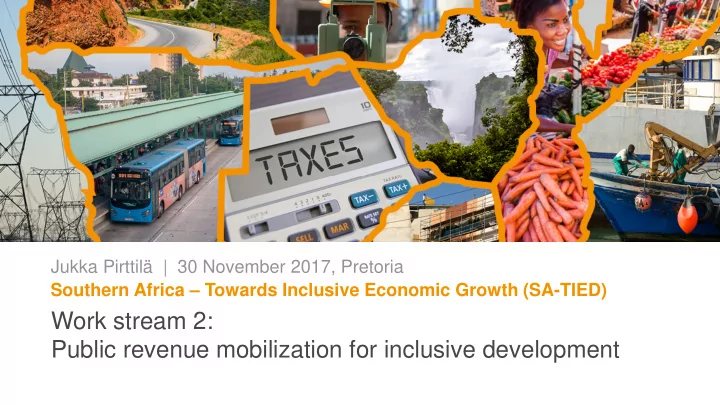

Jukka Pirttilä | 30 November 2017, Pretoria Southern Africa – Towards Inclusive Economic Growth (SA-TIED) Work stream 2: Public revenue mobilization for inclusive development
This work stream has two main aims 1. As a continuation to the Firm-Level Analysis project, a key goal is the work on data – Modify SARS data so that it is easily accessible and well documented – As earlier, the data set also serves the needs of other work streams 2. Actual tax research – Using both administrative SARS data but also other data sets (survey data)
Why worry about taxes? • Clearly, ministries and revenue authorities often focus on revenue raising and improving compliance • However, South Africa also needs new jobs and investments – How distortive are taxes? • Clear linkages to inequality analysis – Taxes and transfers are the most direct way to influence distribution – How large are the trade offs?
Research topics Responsiveness of firms to tax incentives • – The impact of taxation on the self employed, taxed according to the progressive income tax schedule – The effects of incentives such as the special HQC regime on larger firms Microsimulation model for enterprise taxation • – Combined business taxation and owners’ taxes – Can be used to predict taxpayer responses to changes in the overall burden of the tax under the assumption that firm owners minimise their taxes
Research topics continued Compliance • – Profiling models of under-reporting or non-reporting Do firms avoid being handled by the Large business centre? – Field experiments • – Often used to encourage compliance Perhaps more novelty would be in work related to improving employment or growth – – If used, what is experimented must be chosen so that it caters for SARS needs
Research based on survey data • Tax-benefit microsim model, SAMOD, will be kept up to date – Possibility to merge with admin data explored – Used to study work incentives (PTRs, EMTRs) – And the impact of policy reforms on work incentives, as well as inequality • A scoping study on a micro-macro model • Revisiting the ETI with more years of data
Capacity building Data work one area of capacity building • • Research can be conducted jointly with SARS and NT staff members • Participation of SA academic researchers, especially early-career researchers, very welcome – Linking foreign and SA scholars Collaboration with other tax authorities in the region encouraged • – E.g. via ATAF
Timing Year 1 Year 2 • Second batch of work commissioned • Data work starts, to be finished by • Improvements in data access the end of 2018 considered • First research papers commissioned Year 3 Call for papers organised towards • • Papers ready the end of the year / early on • Final seminar during Year 2 All years: annual workshops
Recommend
More recommend